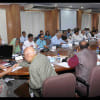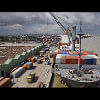Govt employees pay hike temporarily fuelled poverty

The government's decision to raise salaries of all public sector workers by 100 percent in 2015 had inadvertently pushed many least skilled private sector workers below the poverty line temporarily, said a study.
This situation occurred as least skilled workers in the private sector could not cope with the new situation that was created in the labor market.
"The 10 percent upward shift in the poverty line led to a significant proportional increase in the poverty rate among private sector workers, representing an approximately 40 percent rise in the poverty rate due to this alteration in the poverty threshold," the study said.
"If the government's intervention in the labour market raises the public sector workers' wage, it directly increases the public-private wage differentials," Md Al-Hasan, research analyst of the International Food Policy Research Institute (IFPRI), added.
The study found that while the most skilled private sector workers could adjust their wages according to the new market conditions, least skilled workers could not do the same. Consequently, they became poorer even within their own group.
If the least skilled private sector workers' wage and spending remain unchanged, the general price level rise -- as a result of increments for other workers leading to a rise in the price of commodities -- could lead to new poverty cases among them.
Al-Hasan yesterday presented a paper titled "Intervention in Labor Market and Inequality Creation: A Natural Experiment" at a conference in Dhaka.
The event was jointly organised by the Bangladesh Economics Research Network, Association for Economic and Development Studies on Bangladesh, and Bangladesh Institute of Development Studies (BIDS).
The paper was co-authored by researcher Mehrab Bakhtiar of IFPRI, Prof Syed Abul Basher, and Prof Salim Rashid of East West University.
Al-Hasan said they wanted to analyse the results of government intervention and whether it had unintentionally pushed people into poverty.
However, he said that the results of the study were still in the early stages.
The study highlighted that between 2010 and 2016-17, private sector wages increased by approximately 90 percent for least-skilled workers and 140 percent for most-skilled workers.
"However, wage growth for moderately skilled workers was around 45 percent."
Conversely, wage growth for public sector workers ranged between 130 percent and 155 percent during the same period.
In the inaugural session of the research conference, Prof Amin Masud Ali of Jahangirnagar University presented a paper on poverty alleviation and local government fragmentation.
Ali suggested that increasing the number of units in each district could be an effective tool to reduce moderate poverty, but less so for the reduction of extreme poverty, where the scope for increasing fragmentation in order to reduce extreme poverty seems to be restricted to specific contexts.
In the day-long conference, nine papers and a keynote speech were presented.
Among others, Binayak Sen, general director of BIDS, Prof Fahad Khalil of University of Washington, Shyamal Chowdhury of University of Sydney, Atonu Rabbani of University of Dhaka, also spoke at the event.

 For all latest news, follow The Daily Star's Google News channel.
For all latest news, follow The Daily Star's Google News channel. 







Comments